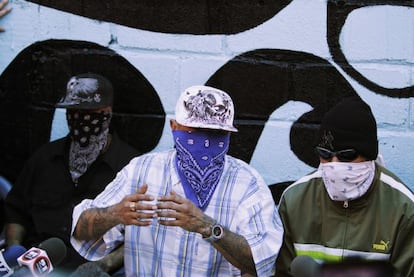Honduran street gangs announce “truce” in exchange to rejoin society
Salvatrucha and Barrio 18 members say they are tired of violence

Two of the most dangerous gangs in Honduras announced a truce on Tuesday under a church-brokered agreement designed to curb crime and violence in one of the countries with the world’s highest murder rates.
The Mara Salvatrucha and the Barrio 18 gangs pledged not to commit any more homicides or recruit new members in exchange for the Honduran government allowing them to rejoin society.
“We want to show society that we are not monsters, and we are going to demonstrate it, but we want support so we can work and earn a living to raise our children. We don’t want any more violence, we want to change,” said Marcos, a spokesman for the Salvatruchas who appeared before television cameras with his face covered and wearing a long check shirt so that he could not be identified by the tattoos on his arms.
With 7,000 members, the Salvatrucha gang, or M13 as it is sometimes known, is one of the most powerful street gangs in the country, according to the Honduran National Observatory for Violence. They called a press conference at a carpenters’ workshop located inside a prison in San Pedro Sula, a city in the north part of the country.
The 50 beds and nightstands they made in the workshop will be donated to the elderly at a rest home, they said.
After 20 years in existence, the gang’s members – who organized themselves following the long and brutal civil wars in Central America, and have made their way to the United States, from where thousands have been deported – are now older and have families. They said they are tired of living a violent life, and of being ostracized by society; they also don’t want their children to become gang members.
Just being part of a gang in Honduras is a felony crime, and those with gang tattoos are automatically accused by law enforcement authorities of being members of one of the two street groups.
The church-brokered agreement is part of a regional peace initiative supported by the Organization of American States (OAS), and was put into practice in El Salvador more than a year ago by the same two gangs.
Despite the critics, the crime rate in El Salvador has dropped by more than half. From 14 daily murders that took place before the truce was announced, there are now five murders a day in El Salvador. Extortion has also dropped by 20 percent.
“It is a process similar to that in El Salvador,” said Adam Blackwell, OAS secretary of Multidimensional Security of the Honduran truce. “First, there is a truce with society, and then little by little they will reach a truce among themselves. There is no magic formula, but this strategy of crackdown by law enforcement has not worked. And even though the process is a fragile one, it has shown that it can work in El Salvador.”
Honduran Bishop Rómulo Emiliani, who has a long history of trying to negotiate peace between gangs in San Pedro Sula and inside the prison, was instrumental in brokering this peace plan.
"This is the beginning of something new, but it's not the end," he said. "This is a covenant between the gangs and Honduran society."
Tu suscripción se está usando en otro dispositivo
¿Quieres añadir otro usuario a tu suscripción?
Si continúas leyendo en este dispositivo, no se podrá leer en el otro.
FlechaTu suscripción se está usando en otro dispositivo y solo puedes acceder a EL PAÍS desde un dispositivo a la vez.
Si quieres compartir tu cuenta, cambia tu suscripción a la modalidad Premium, así podrás añadir otro usuario. Cada uno accederá con su propia cuenta de email, lo que os permitirá personalizar vuestra experiencia en EL PAÍS.
¿Tienes una suscripción de empresa? Accede aquí para contratar más cuentas.
En el caso de no saber quién está usando tu cuenta, te recomendamos cambiar tu contraseña aquí.
Si decides continuar compartiendo tu cuenta, este mensaje se mostrará en tu dispositivo y en el de la otra persona que está usando tu cuenta de forma indefinida, afectando a tu experiencia de lectura. Puedes consultar aquí los términos y condiciones de la suscripción digital.








































